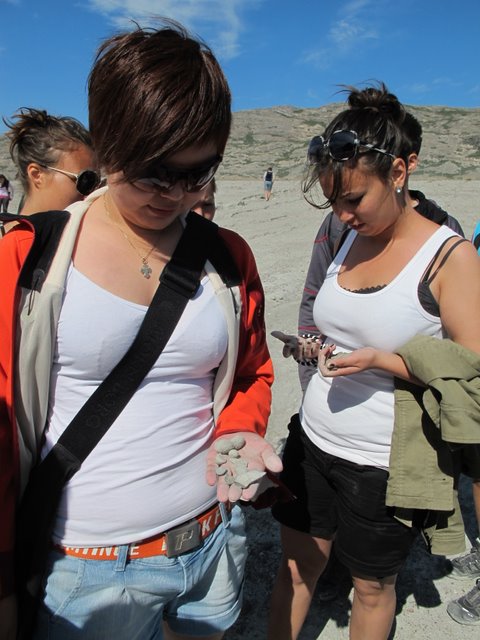Today's commentary
Submitted by Christine (Denmark), Maria (USA), Sofie (Greenland), and Tina (Greenland)
We started our morning with an interesting presentation by two real life scientists, Laura Levy and Patrick Applegate. They talked about glacial history, landforms and how ice cap has moved. They also talked about how it is to be a scientist today and encouraged us to start our own research projects. We learned about the fossil formation and the difference between the different layers of sand structures left by the glaciers.
 Scientist Laura Levy tells us about her work. Photo by Laura Lukes (2011)
Scientist Laura Levy tells us about her work. Photo by Laura Lukes (2011)
 JSEP group on glacial delta deposits. (Photo by Laura Lukes, 2011)
JSEP group on glacial delta deposits. (Photo by Laura Lukes, 2011)
 Laura Levy and Patrick explain the landscape. Photo by Laura Lukes (2011)
Laura Levy and Patrick explain the landscape. Photo by Laura Lukes (2011)
Today was also the day where we picked up our mountain bikes so now we have more freedom and it is easier to go to our sites and dinner. We road our bikes to location where Laura and Patrick gave us a better demonstration of their daily research and once more we looked for fossils.
 Traveling by bike. Photo by Laura Lukes (2011)
Traveling by bike. Photo by Laura Lukes (2011)
 Scientist Laura Levy
Scientist Laura Levy
 Emil finds a peanut shaped concretion. Photo by Laura Lukes (2011)
Emil finds a peanut shaped concretion. Photo by Laura Lukes (2011)
 Laura Levy explains how fossils form to Kurt and Jeannie. Photo by Laura Lukes (2011)
Laura Levy explains how fossils form to Kurt and Jeannie. Photo by Laura Lukes (2011)
 Maria finds a fossil. Photo by Laura Lukes (2011)
Maria finds a fossil. Photo by Laura Lukes (2011)
 Rebecca's amazing fossil find. Photo by Laura Lukes (2011)
Rebecca's amazing fossil find. Photo by Laura Lukes (2011)
 Titte and Avaruna find fossils. Photo by Laura Lukes (2011)
Titte and Avaruna find fossils. Photo by Laura Lukes (2011)
In the afternoon we prepared our own research project and organized our schedule. We had to find out where to collect data and what we needed for our investigation. It was a big logistic project but we succeed and learned that there is a lot of work before going out into the field.
Now we are ready to go into the field, collect our data and proceed with our research
Today's scientists
Laura Levy (Dartmouth)
 Patrick and Laura Levy show locations on the map. Photo by Laura Lukes (2011)
Patrick and Laura Levy show locations on the map. Photo by Laura Lukes (2011)
Patrick Applegate (University of Stockholm)
Agenda Highlights
Lecture by guest scientists Laura Levy and Patrick Applegate
Fieldtrip to glacial runoff delta deposits (by dog sled puppies) and fossiletten
Cleaning the School!
Student Research Groups: Devloping a research plan for days in field
Vocabulary
sikorsuit (Greenlandic)- glacier
sermersuaq (Greenlandic)- inland ice
rouche moutonnee- bedrock that is smoothed on one side by glacier and broken off on other side (indicates ice movement direction)
erratic- boulder carried by, then dropped/left behind by glacier as ice melts and recedes
kettle lake-glacial lake formed by large pieces of glacier that broke off and was left behind as ice melted/receded
moraine- pile of glacial till left behind by glacier as it recedes
isostasy- elevation of Earth's surface is a balance between the weight of the lithosphere and the bouyancy of the asthenosphere
lichenometry- the study of using the size of lichens to determine the surface exposure of rocks
loess- very fine, wind blown sediment deposits

